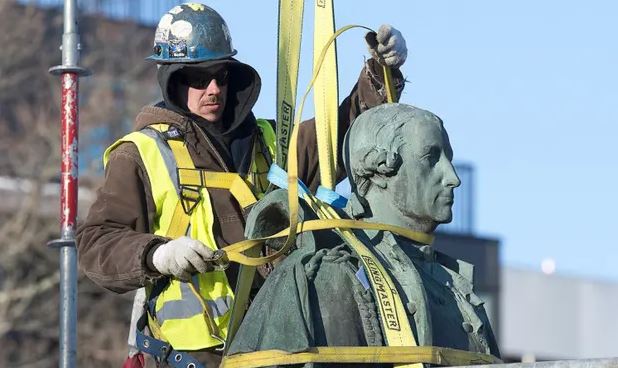In 1749, the city of Halifax’s founder Edward Cornwallis offered rewards for ethnic cleansing – and now his bronze has been removed
Under a bright winter sun, a harness was attached to the bronze figure of Edward Cornwallis – a British military officer credited with establishing the Canadian city of Halifax and reviled for offering rewards for ethnic cleansing – and a crane lifted it into the air.
There was little fanfare when the statue was removed last week from the perch it had occupied for almost 90 years. But a modest crowd gathered on Sunday to cheer the now-empty plinth – and the city’s first public repudiation of its colonial history.
The lack of bitter confrontation marked a striking contrast to the large – and at times violent – clashes in the US last year as Confederate statues were removed.
 |
The statue of Edward Cornwallis is removed from its perch in Halifax. After months of public debate, the city council last Wednesday voted 12-4 to remove the statue. By Friday it was gone. Photograph: Canadian Press/Rex/Shutterstock |
The statue of Cornwallis has increasingly become the target of vandalism and protest as his legacy has undergone greater historical scrutiny: recent scholarship has highlighted his role in a 1749 proclamation that offered a bounty for the scalps of the region’s indigenous Mi’kmaq people.
“When I was young we were considered the descendants of savages, wild people, barbarians – and treated as such,” says Mi’kmaq elder and historian Daniel Paul, who is widely credited with helping expose Cornwallis’s troubled legacy.
“The scalp proclamations were never talked about. I had heard them when I was young, but never seen any proof or anything. And of course Caucasian historians never talked about them,” Paul said.
After months of public debate, the city council last Wednesday voted 12-4 to remove the statue – one of many tributes to Cornwallis across Nova Scotia – and by Friday afternoon it had gone.
“We are all the product of our history. But we should not be a prisoner to it,” said mayor Mike Savage. “We must not lose an opportunity to tell a new story from the old. If we leave a hole where this statue now stands we surrender to the urge to bury the lessons of history, to hide the truth.”
Not every councillor was convinced. Some argued that the statue should instead be moved to another spot.
“Because it was a temporary decision, it means that the conversation and the politics is probably going to continue,” said Shirley Tillotson, a historian at Dalhousie University, who expects divisions to become more public once the city determines the final destination for the statue.
The city’s quick response after the vote may have helped to prevent more heated debate, Tillotson said. But any backlash is unlikely to reach the fever pitch it did in the US.
While some Americans claim that Confederate figures such Robert E Lee are integral to their history, the same is not true about most characters from Canada’s past, said Stephen Henderson, a history professor at Acadia University.
“For Nova Scotians, Edward Cornwallis is sort of just another British officer who could be interchanged with any other British officer,” he said.
The removal of Cornwallis comes as Canada is starting to confront past injustices inflicted upon indigenous communities.
Paul said the decision marked step in the right direction – and a vindication of his years of scholarship. “We still have have a long way to go. But you’re overcoming systemic racism, which is no easy thing to do.”



